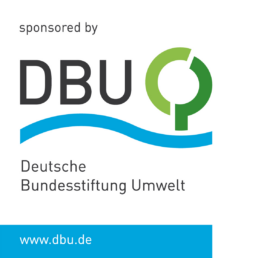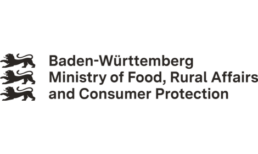Welcome to Fit for Biodiversity
EU project for biodiversity in the food sectorLIFE23-GIE-DE-LIFE BGP Food

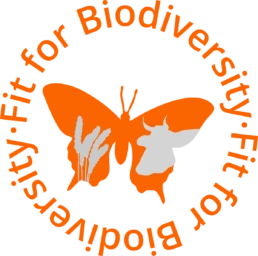
What is it about?
Fit for Biodiversity promotes biodiversity in the food sector, as sustainable food production fosters greater biodiversity. More biodiversity creates better and safer food. Our food production is inconceivable without biodiversity; that is why the EU Fit for Biodiversity project has set itself the following goals:

Better biodiversity performance in food production

Effective incentive programmes from companies for farmers

Sensible use of biodiversity credits for insetting programmes

Overview of tools & key performance indicators for biodiversity assessment

Training for managers, CSR managers, auditors and accountants

Strengthening national initiatives to protect biodiversity (EU-wide)

Training courses
How can stakeholders in the food sector improve their biodiversity performance while making a meaningful contribution to the protection of biological diversity?
The “Fit for Biodiversity” project targets executives, CSR managers, as well as auditors and accounting professionals in the food sector. The aim of the training sessions is to support professionals and decision-makers in strengthening their companies’ biodiversity performance and in meeting current and future requirements.
The Global Nature Fund and the Lake Constance Foundation offer free online training courses that provide practical and concise knowledge. The content is tailored to the needs of each target group and includes concrete recommendations for action.
We make you fit to improve the biodiversity performance in your company and to make well-founded, more sustainable decisions.
The free training course comprises four 60-minute modules with the following content:
- What is biodiversity, and why is it particularly essential for the food sector?
- An overview of biodiversity agreements and their impact on the food sector
- Main causes of biodiversity loss – a look at the drivers and their role in the food sector
- Supply chains with high biodiversity risks: what does this mean for the food sector?
- Biodiversity and purchasing behaviour: How do I utilise the topic for my company?
- Important food standards and their added value for
- Effective incentive systems for implementing measures with farmers
- Sensible use of biodiversity credits in insetting programmes
Further information and registration for the training courses for managers can be found on the Global Nature Fund website.
WWe make you fit to promote the topic of biodiversity protection in your company and to fulfil the current and future EU requirements on biodiversity (e.g. CSRD E4)
The free training course comprises four 60-minute modules with the following content:
- What is biodiversity and why is it particularly essential for the food sector?
- An overview of biodiversity agreements and their impact on the food sector
- Main causes of biodiversity loss – a look at the drivers and their role in the food sector
- Supply chains with high biodiversity risks: what does this mean for the food sector?
- Biodiversity and purchasing behaviour: How do I utilise the topic for my company?
- Carrying out a materiality analysis and risk assessment of biodiversity
- Measurement and evaluation of biodiversity performance in companies: Instruments and indicators (e.g. Encore, WWF Biodiversity Risk Filter)
- Development of targets and measures to improve biodiversity performance
- New reporting requirements on biodiversity: CSRD (E4 Biodiversity & Ecosystems) and the upcoming sector-specific requirements for the food and beverage industry
- International frameworks for sustainability management and sustainability reporting (SBTN, TNFD)
- Integration of biodiversity into environmental or sustainability management
- Important food standards and their added value for biodiversity
- Effective incentive systems for implementing measures with farmers
- Sensible use of biodiversity credits in insetting programmes
Further information and registration for the training courses for CSR managers can be found on the Global Nature Fund website.
The Lake Constance Foundation equips you to competently support companies in the preparation and evaluation of sustainability and CSRD reports. In this training course, you will learn how to carry out well-founded assessments and certifications based on suitable criteria.
The free training course comprises three modules of 90 minutes each.
The modules provide background knowledge on legal requirements, impacts and dependencies of the food sector on biodiversity as well as materiality and risk analysis. Practical targets, measures for prevention, reduction, conversion and compensation as well as relevant performance indicators for monitoring are also covered. Challenges and solutions as well as the integration of biodiversity into environmental and sustainability management systems round off the programme.
Make yourself fit for consulting and help companies to set ambitious targets for the protection of biodiversity!
Further information and registration for the training courses for CSR managers can be found on the website of the Lake Constance Foundation.
Biodiversity measurement
How can companies record and evaluate biodiversity?
Justus Liebig University supports companies in the food sector in identifying suitable instruments for this task. The focus here is on both risk assessment for biodiversity (impacts) and for the companies themselves (dependencies), as well as the evaluation of measures and activities to promote biodiversity. In order to monitor the long-term success of companies’ commitment to biodiversity, it is important to collect relevant data on a regular basis. To this end, Justus Liebig University is working on a list of key performance indicators for the food sector. This list of “key performance indicators”, together with recommendations on data sources and the necessary framework conditions for biodiversity monitoring, will help companies to achieve their biodiversity goals.


Biodiversity Credits
How do Biodiversity credits work and how can they financially support actors of agri-supply chains?
Biodiversity credits are market-based instruments representing measurable, evidence-based, and verifiable outcomes of actions taken to protect, restore, or enhance biodiversity. These credits are generated through certified projects and can be purchased by companies to demonstrate their commitment to nature-positive practices. When integrated into an agricultural supply chain, it can support farmers by providing direct income to implement practices such as regenerative agriculture and habitat preservation, thereby improving the environmental footprint of the entire supply chain.
Through the Fit for Biodiversity project, Meo Carbon Solutions support food sector companies in integrating biodiversity restoration into their core strategies using biodiversity credits, aligned with their corporate goals. By promoting crediting systems and insetting initiatives within the European agricultural supply chains, the project encourages more sustainable business practices.
Incentives
How can companies design incentive systems to encourage more agricultural businesses to implement measures to protect biodiversity on their land?
Various incentive systems already exist that show how farms can be motivated to manage their fields and operations in a more biodiversity-friendly manner. How are these structured, and which ones work particularly well? What do companies need to consider when designing such programs? The Lake Constance Foundation will answer all these questions in a guide. A short video supplements the guide and highlights positive examples.
In addition to these examples, the financial aspect is also addressed: What does a specific biodiversity-promoting measure cost? What are the costs of a corresponding program that also includes, for example, advising agricultural farms? And what are the expected benefits for the company? A corresponding cost-benefit analysis complements the research on incentive programs.


Networks
Are you an association, NGO, or network in the food sector that brings companies together? Do you see opportunities to strengthen your work with biodiversity by tapping into our experience of building and running a multi-stakeholder association? Food for Biodiversity can support you with proven tools, training, and a practical toolkit – as well as with knowledge exchange, workshops, and links to European and international partners. Together, we can help your members integrate biodiversity into their strategies, create real business value, and contribute to resilient food systems across Europe.

Publications, tools and media
The publications section presents the most important results of the “Fit for Biodiversity” project. Here you will find a variety of resources – from practice-orientated tools and detailed reports to knowledge videos and recordings of our training sessions. This platform provides valuable insights on key topics such as criteria sets in the agricultural sector, effective incentive schemes, biodiversity credits and overviews of tools for measuring biodiversity along the entire supply chain.
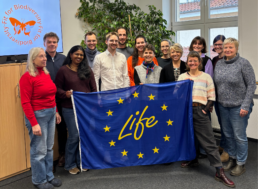
Contact us
For questions about the overall project:
Global Nature Fund
Jenja Kronenbitter
Project Manager Fit for Biodiversity
For questions about Food for Biodiversity:
Food for Biodiversity
Oliver Peters
Project Manager
Project partner

The Global Nature Fund (GNF) coordinates the EU LIFE project Fit for Biodiversity, formally called Biodiversity Governance and Performance in the Food Sector. The GNF was founded in 1998 in Radolfzell to promote the worldwide protection of lakes and wetlands. Today, GNF works in the areas of nature conservation, international development and business & biodiversity. The GNF is strongly committed to insect conservation and biodiversity and promotes environmentally friendly practices. GNF coordinates the EU project Fit for Biodiversity.

The Lake Constance Foundation is an environmental protection organisation that works on a project-oriented basis for promoting sustainability and nature conservation – regionally, nationally and internationally. It is active in the fields of action of energy transition, agriculture & the food sector, nature & water conservation and business & biodiversity and works closely with stakeholders from business, specialist administrations, local authorities, politics and other interest groups. It was founded in 1994 and is based in Radolfzell on Lake Constance.
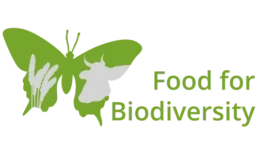
Food for Biodiversity e.V. is an association of companies in the food sector, environmental associations, standard organisations and scientific institutions founded in 2021. Its aim is to anchor the protection and promotion of biodiversity along the entire value chain of the food industry. They develop practical solutions, promote dialogue between business, science and environmental organisations and are committed to a sustainable transformation of the industry.

Meo Carbon Solutions is an independent consultancy from Cologne with many years of experience in the field of sustainability. They are active in Europe, South East Asia, Africa and America and carry out projects for public and private clients. Their projects regularly involve stakeholders from industry, agriculture, NGOs, research organisations and public authorities.

Justus Liebig University Giessen (JLU) contributes its scientific expertise in the field of agricultural sciences and biodiversity to the project. It supports the development and evaluation of biodiversity-promoting measures on farms and contributes to the scientific foundation of practical approaches in the food value chain.
Advisory Board

With financial support from
This project has received funding from the European Union’s LIFE programme under grant agreement No. 101148484. However, the views and opinions expressed are solely those of the authors and do not necessarily reflect those of the European Union or CINEA. Neither the European Union nor the granting authority can be held responsible.


